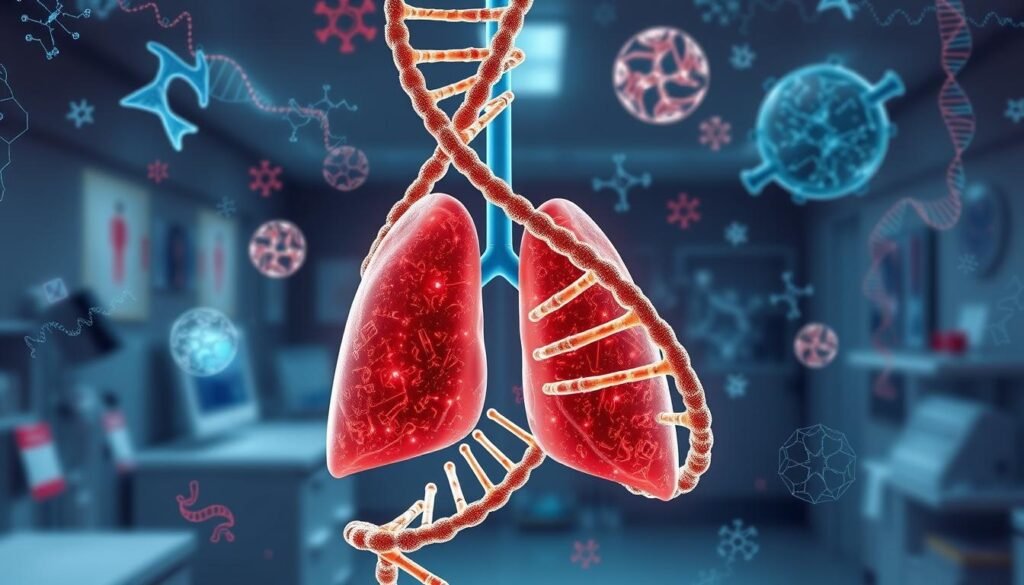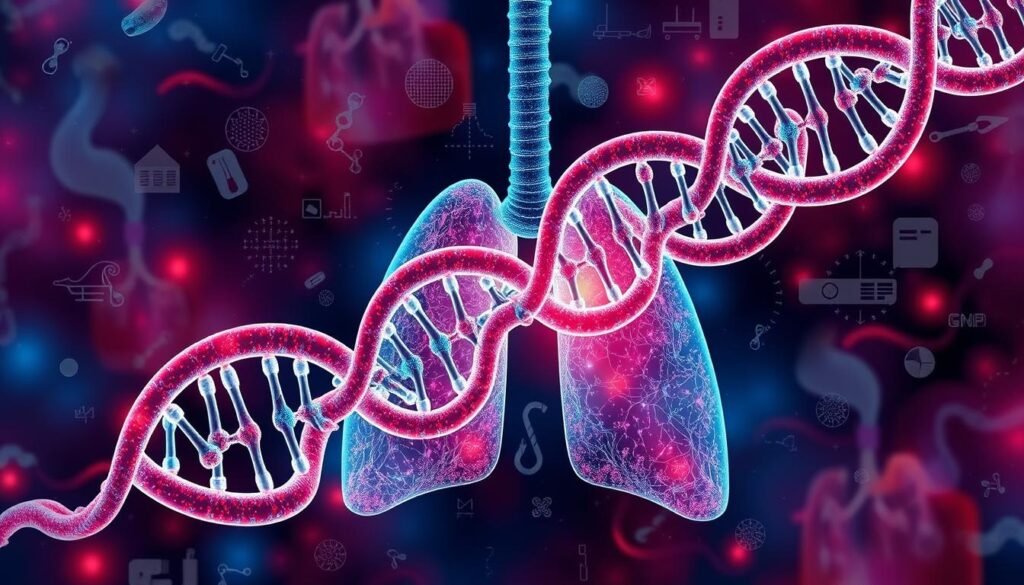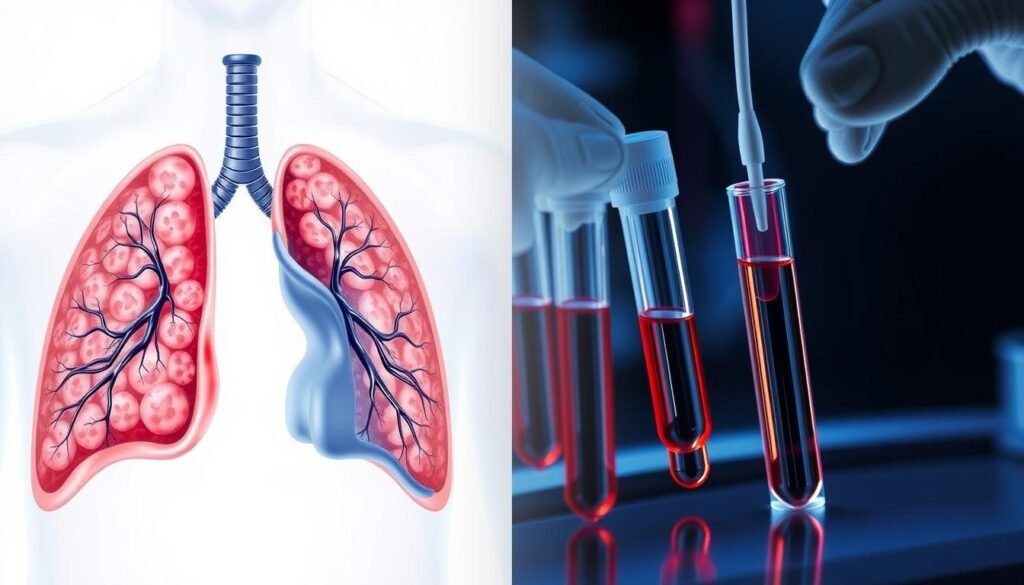Did you know about the huge role smoking plays in lung cancer in the U.S.? It’s behind 87% of all lung cancer cases. This fact highlights the need for early spotting and personal care methods in tackling lung cancer. As a top cause of cancer deaths, genetic testing now plays a key role. It helps find those at risk and offers tailored treatments to improve health significantly.
Genetic Testing for Lung Cancer Risk is not just about spotting risk. It also makes sure treatments hit the mark. This kind of testing looks at gene changes to guide personalized care. This approach helps fight cancer while keeping healthy cells safe. For more details, you might want to visit Genetic Testing for Lung Cancer.
Key Takeaways
- Smoking remains the leading cause of lung cancer, contributing to 87% of cases.
- Early detection through genetic testing can lead to better treatment outcomes.
- Targeted therapies can be developed based on specific genetic mutations.
- Genetic predispositions significantly influence treatment strategies.
- Individuals with a strong family history of cancer may benefit from genetic counseling.
- Understanding genetic factors can enhance smoking cessation efforts.
Understanding Genetic Testing for Lung Cancer
Genetic testing is key in spotting who might get lung cancer. It looks at DNA for mutations linked to this illness. Knowing about genetic markers helps in assessing cancer risk and shaping treatment plans.
What is Genetic Testing?
Genetic testing checks genes for changes that could raise lung cancer risk. It focuses on mutations and variants. This is crucial for creating treatments that better patient health. Around 60% of lung adenocarcinomas patients have certain mutations. This shows how genetic testing can reveal important info for doctors and patients.
Importance in Lung Cancer Diagnosis
Genetic testing has changed how lung cancer is diagnosed. It gives details on a patient’s genetic make-up. This is especially key for non-smokers, with about 20% of lung cancer deaths in the U.S. in those who’ve never smoked. Testing finds people suited for specialized treatments, especially with EGFR or KRAS gene mutations. Between 10% and 25% of non-small-cell lung cancer patients have these mutations. This info is vital for picking the best treatment.
| Variant Classification | Description |
|---|---|
| Pathogenic | Variants known to cause disease. |
| Likely Pathogenic | Variants with strong evidence indicating disease association. |
| Variant of Uncertain Significance (VUS) | Variants with unknown impact on health. |
Sticking to the ACMG 2015 guidelines helps in understanding genetic markers correctly. High standards in lung cancer genetics are maintained by confirming pathogenic and likely pathogenic variants. Genetic testing is a cornerstone in tailoring lung cancer treatment, improving chances for effective strategies.
The Role of Genetics in Lung Cancer
Genetics play a crucial role in understanding lung cancer. Gene mutations impact how the disease develops and progresses. Knowing about these can help create treatments aimed at better results for patients.
How Gene Mutations Affect Cancer Development
Gene mutations disrupt cell functions and cause uncontrolled growth, leading to tumors. Mutations in genes like EGFR and KRAS are key players in lung cancer, especially non-small cell lung cancer (NSCLC). Around 80% of lung cancers are NSCLC. Recognizing these mutations allows doctors to customize treatment plans.
Types of Lung Cancer and Genetic Links
There are two main lung cancer types: non-small cell lung cancer (NSCLC) and small cell lung cancer (SCLC). NSCLC includes types like adenocarcinoma, squamous cell carcinoma, and large cell carcinoma. Each has specific genetic mutations affecting its growth. Gene changes mainly seen in NSCLC make it more common and aggressive.
In contrast, SCLC is usually more linked to things like smoking than to genetics. It is known for being very aggressive.

Genetic Testing for Lung Cancer Risk
Genetic testing is key for spotting lung cancer risk and picking the best treatment. It looks at gene changes, helping doctors plan care suited to each person’s genes.
Common Genetic Tests for Lung Cancer
Lung cancer tests check for key markers like ALK, EGFR, and KRAS. These markers help see the cancer’s genetic makeup. Using techniques like next-generation sequencing (NGS), doctors get a full view of the tumor.
Targeted Therapies and Gene Changes
Targeted therapies have changed lung cancer care with treatments that attack certain mutations. For example, drugs like sotorasib aim at specific gene changes, bettering patient outcomes. Non-small cell lung cancer (NSCLC), the main lung cancer type, shows mutations like TP53 and KRAS in many cases. Knowing these helps choose the right targeted therapy.
Genetic Risk Factors Associated with Lung Cancer
Genetic and environmental factors, like smoking, affect lung cancer risk. Certain lung cancer types, for instance adenocarcinoma, are more common in younger, non-smokers. This shows the role of genes and lifestyle in lung cancer. Tests for these genetic risks help people make choices about screening and prevention.

| Genetic Alteration | Associated Targeted Therapy | Mutation Prevalence |
|---|---|---|
| ALK | Alectinib, Brigatinib, Ceritinib | 3-5% |
| EGFR | Osimertinib, Erlotinib | 10-15% |
| KRAS | Sotorasib | 30% |
| TP53 | (No specific therapy) | 50% |
| BRAF | Dabrafenib, Trametinib | 2-3% |
Process of Genetic Testing
Genetic testing for lung cancer starts with a detailed check-up. This may involve several visits or calls. It helps doctors understand the patient’s health history and risk factors. This is crucial for choosing the right way to collect samples.
Biopsy and Sample Collection
Taking a tissue biopsy is a key part of genetic testing. Doctors need to get a piece of the tumor to study it. They might use a method called bronchoscopy or a needle biopsy for getting the sample. Together with the patient’s and family’s medical history, this can show if there is a genetic risk for lung cancer. Questions about family health can reveal important details like the cancer type and when it was diagnosed.
Liquid Biopsies: An Emerging Option
Liquid biopsy is a new method in genetic testing. It looks at tumor DNA in the blood, different from usual tissue biopsies. It’s easier on the patient since it’s less invasive. Plus, it offers quick updates about the cancer’s status and genetic changes. This helps in customizing treatment. Yet, it might not catch all genetic mutations that a tissue biopsy would find.

| Biopsy Method | Advantages | Limitations |
|---|---|---|
| Tissue Biopsy | Comprehensive analysis of tumor DNA | Invasive procedure, potential discomfort |
| Liquid Biopsy | Less invasive, quicker results | May miss certain mutations, not always definitive |
Implications of Genetic Test Results
Understanding genetic test results is key for those with lung cancer. It helps tailor healthcare plans by looking at one’s genes. This is crucial for making smart treatment choices and handling cancer.
Understanding Your Genetic Profile
Your genetics might show mutations linked to certain lung cancers. Knowing these can lead to talks on how to prevent cancer. For instance, a GSTM1 gene mutation suggests a higher risk, pushing doctors to advise on lifestyle changes and screenings. This knowledge lets patients take part in their care and preventive steps.
Impact on Treatment and Management Decisions
Genetic tests greatly affect treatment options. They can show if patients qualify for therapies targeting their cancer type. Such a tailored approach often results in better outcomes. For example, those with positive tests might look into prevention, lifestyle changes, or specific strategies to fight lung cancer effectively.
Genetic testing does more than spot risks. It encourages actions like quitting smoking and using health services more actively. This leads to a hands-on approach to cancer care. For more on genetic testing’s impact, especially on minority groups, check out this article.
Personalized Medicine and Lung Cancer
Personalized medicine changes how we treat lung cancer. It makes treatment plans based on each person’s genes. This method uses targeted therapies that match the patient’s tumor traits. It makes treatment more effective and reduces side effects. With genetic tests, doctors find mutations that cause tumor growth. This helps them choose the best treatment for each patient.
Tailoring Treatment Based on Genetic Information
Using genetic information in lung cancer treatments is key. Some mutations, like those in the ALK gene or the EGFR, guide treatment choices. About 5% of non-small-cell lung cancer (NSCLC) patients have ALK gene changes that respond well to crizotinib. Patients with EGFR mutations often do well with EGFR tyrosine kinase inhibitors. Personalized medicine improves survival and life quality for patients.
Research Advances in Targeted Therapies
Research today seeks new genetic markers for lung cancer. Studies have found risk variants for other diseases, showing the wide use of genetics. Genetics affect how people respond to drugs. Clinical trials show targeted therapies can stop tumor growth. This is a big step forward from traditional chemotherapy. For more on genetic testing and lung cancer, click here.
Genetic Counseling: What You Need to Know
Genetic counseling is key for anyone facing the complex world of genetic tests, especially for lung cancer risks. It helps people understand their genetic risks and how these could affect their family. This knowledge is crucial for making important health decisions.
The Importance of Pre- and Post-Test Counseling
Pre-test counseling readies individuals by explaining what the genetic tests can reveal. They learn about their risk and what test outcomes mean. Post-test counseling then helps make sense of the results. Insurance may often cover these sessions if deemed necessary. The length of these sessions varies but aims to thoroughly discuss all aspects.
Understanding Family Implications of Genetic Results
When similar cancers run in families, like ovarian or breast cancer, genetic counseling is especially vital. It’s crucial for those diagnosed under 45 or with rare cancer types. Counselors provide valuable information for decision-making regarding children and testing other family members.
For signs of lung cancer, check this link out. Keeping up with genetic advances through expert consultations is important for lung health insights.
Ethical Considerations in Genetic Testing
Genetic testing for lung cancer involves ethical issues. These affect our genetic privacy and chance to get insurance. It is key to know how genetic info might affect you.
Privacy of Genetic Information
Privacy is a big worry with genetic testing’s growth. If you get tested, think about who sees your genetic info. The Genetic Information Nondiscrimination Act of 2008 (GINA) helps protect you from discrimination by health insurers and employers. Yet, concerns about insurance remain. About 52% of genetic service providers think testing could harm your insurability.
Impacts on Insurability and Employment
Fear of bias may stop some from genetic testing. People worry about job security and health insurance. GINA fights discrimination but doesn’t cover everyone. For instance, military members and some insurance plans are left out. We need more laws for full protection against genetic bias.
| Aspect | Protection Offered | Limitations |
|---|---|---|
| Health Insurance | GINA protects against discrimination | Excludes specific insurers and military |
| Employment | GINA prevents job discrimination based on genetic info | Does not cover all employment circumstances |
| Genetic Privacy | Patient control over genetic information | Risk of data breaches and misuse |
As we use more genetic testing in healthcare, we must look at privacy and fairness. Balancing personal rights with risks in jobs and insurance is key.
Conclusion
Genetic testing is key to knowing the risk and growth of lung cancer. Scientists have found a connection between our genes and lung cancer risk. Specifically, changes in the 15q24 area of chromosome 15. This shows why finding cancer early is so important. It lets us take steps early to manage our health.
Also, knowing our genetic info helps patients and doctors make smart choices about care. Doctors can create treatments that are just right for each person’s genetic makeup. This leads to better results from treatments.
In the end, genetic testing does more than just reveal lung cancer risks. It highlights the role of genetic counseling. With counseling, people can understand their genetic reports and what they mean for them and their families. It opens the door to improved health care and steps to prevent lung cancer.